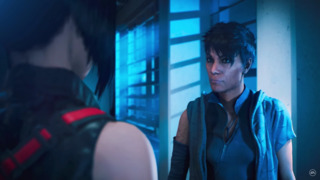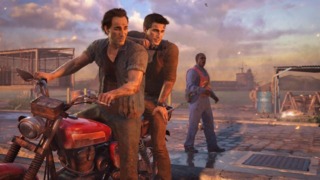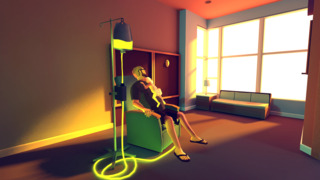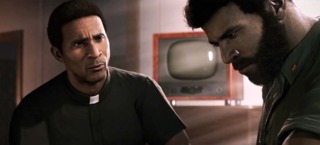2016 in Review: Say Something, Damn It
By Cav829 17 Comments
I'm growing tired of the complacency shown in video game storytelling.
For a few brief moments, I thought we might have turned a corner in 2015. From indie games such as SOMA, Cibele, and Life is Strange, to AAA games such as Witcher 3, it was actually a year where gamers could hold their heads high and proudly proclaim why yes, video games can tell meaningful tales. And then, 2016 was a crushing reminder how far the medium still has to go.

Gaming has gotten really good at world building. From the soulless dystopian City of Glass, to the post-Dollar Flu wastes of New York City, to the rising tensions over Augmentation of near-future Prague, we've had our fair share of interesting settings this year. And yet, the three games mentioned above feature the same level of trite, cliche storytelling that risks and says nothing. Factions in each of these games are depicted in less shades of grey and more extremist alternatives. The theme of each game can be summarized in the simplest of sentences. I dunno, ceding control to corporations might be a bad thing. The same mistake is repeated in each case in assuming presentation of a complex or interesting view is sufficient for discussion of that view. Attempts to be intellectual instead come off as pretentious.
It is tempting to say that the medium itself creates challenges for telling traditional stories. Open-world games that cede control to the player create pacing challenges for their writers. Action games must be careful not to bog down the flow of the game through long periods of plot exposition. Many indie games attempting to wrestle with progressive topics have suffered blowback from a gaming audience often preferring escapism over challenging their own world views.

Yet we've seen enough examples over the past few years that show there are spaces between the extremes to play with. The best example of this from 2016 is Uncharted 4: A Thief's End. The Uncharted series has long been derided as "National Treasure: the Video Game." The "plot" of the series is often referenced in the sneeriest of manners. Series protagonist Nathan Drake is depicted in-game as a puckish rogue even while mocked by fans for being more of a sociopathic serial killer.
Yet, Neil Druckman had shown his writing chops off in 2013's The Last of Us and its DLC followup, Left Behind. that it was possible to combine spectacle and intelligent storytelling in the same package. And the lessons Naughty Dog learned from those efforts were certainly on display here. Nobody could confuse Uncharted 4's plot with something especially deep. And yet, it manages to tell an entertaining tale of greed and obsession with strong themes and interesting three-dimensional characters.
Instead of ignoring previous characterizations, the game takes sometimes cartoonish aspects of existing characters to their natural conclusions. Nathan and Elena are forced to deal with domestic realities following years of adventure. Often times, we joke at the end of action movies that romances are doomed for failure once reality comes crashing down upon the protagonists. Uncharted 4 takes a very Incredibles take on what that would actually be like.It manages to wring just about every ounce of story from a series most had assumed finished and had little interest in revisiting.
Indie gaming of course continues to take chances, yet I'd hesitate to say it was as strong a year as the prior. The Witness's plot is at best a mess and serves more of a vehicle in presenting Jonathan Blow's world view. Inside is more of an abstract work more akin to art than literature. Firewatch has some of the most well-realized characters in a video game this year, but I'd suggest the characters are much more of interest than the plot. I love the presentation of Bound, but it's a lot more style and far less substance.

If there's one game in 2016 which takes full advantage of the medium for story purposes though, it's That Dragon, Cancer. Not enough praise can be placed upon the ways this game helps the player understand the helpless reality of a terminal disease. Gaming more than any other storytelling medium has the capability of making the viewer experience a story first-hand, and this is the best possible example of that in practice. Of course, this is a smaller indie title able to take chances in a medium dominated by escapist fantasy. That Dragon, Cancer deals with the total opposite, reminding players to cherish our fleeting existence for everything it is worth.

It's easy enough to dismiss this all as a rant about AAA storytelling, but that's hardly the case. After all, there is room for big-budget popcorn flicks as well as prestige pictures in Hollywood. Mafia III managed to find a happy middle-ground between the two with its gritty depiction of crime and racial tensions in 1960's New Orleans. If anything, the story is more the attraction here than the gameplay. Ten hours of plot instead are stretched into a thirty-plus hour open-world game and the result is significant pacing issues. Yet, it still manages to rescue what might have been an otherwise forgettable addition to the crowded open-world genre.
There are enough examples out there now to show that we need not accept gaming as an inferior storytelling medium. The minds that continue to create such well-realized worlds certainly possess the capabilities to tell interesting tales. It's far too easy to be cynical and believe video game storytelling needs to be safe so not to offend potential consumers. Here's hoping 2017 helps to buck one of my least favorite trends of 2016.
